
Is your water feeling a bit off lately? It might be a sign that your water softener is in need of some attention. From mineral buildup to decreased water pressure, there are a few key indicators that suggest your water softener could use a check-up. In this article, we will walk you through the signs that your water softener needs servicing and provide you with helpful tips to ensure your water is soft and clean. So, grab a glass of water (or maybe not just yet) and let’s get started!
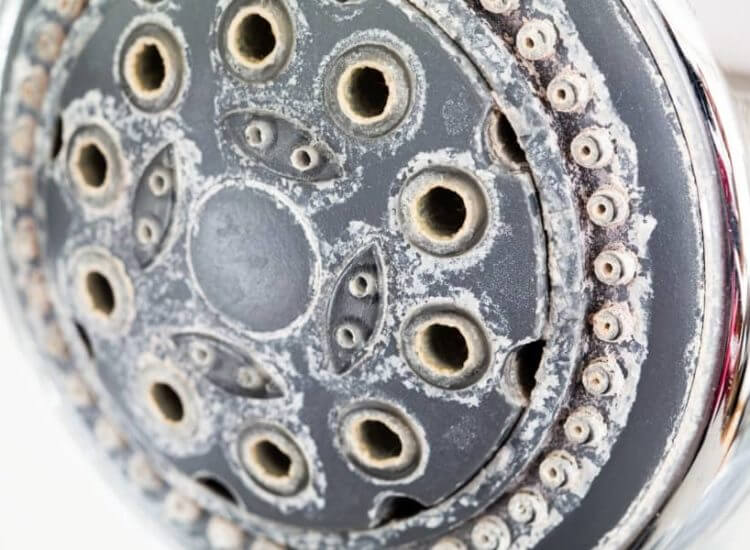
This image is property of angelwater.com.
Decreased Water Pressure
Faucets and Showerheads
If you have noticed a decrease in the water pressure coming out of your faucets and showerheads, it may be a sign that your water softener needs servicing. Over time, minerals from hard water can build up in the plumbing system and cause blockages, ultimately leading to decreased water pressure. If you find yourself constantly adjusting the faucet or showerhead to get adequate water flow, it is time to have your water softener checked.
Clogs and Blockages
Another sign that your water softener needs servicing is the occurrence of clogs and blockages in your plumbing system. When hard water minerals, such as calcium and magnesium, accumulate in pipes and fixtures, it can lead to the formation of stubborn clogs. These clogs can not only restrict water flow but also cause costly plumbing issues if left unaddressed. If you have been experiencing frequent clogs in your sinks, toilets, or shower drains, it is advisable to have your water softener inspected.
Hard Water Stains
Faded Clothing
One of the unpleasant effects of hard water is its ability to leave stains on clothing. If you’ve noticed that your clothes have been losing their vibrancy and appearing dull or faded after washing, it could be due to hard water stains. The minerals present in hard water can bind to fabrics and result in discoloration, making your clothes appear older and less vibrant than they actually are. If you want to restore the brightness of your clothes and prevent further damage, it is important to address the issue with your water softener.
Spots on Dishes and Glassware
Hard water can also leave unsightly spots on your dishes and glassware, making them look dirty even after they’ve been washed. These spots are caused by the minerals in hard water that remain on the surface of the dishes and glassware as the water evaporates. If you find yourself spending extra time scrubbing or rewashing your dishes to remove these spots, it may be a sign that your water softener needs attention. By ensuring that your water is properly softened, you can say goodbye to those stubborn spots and enjoy clean, spot-free dishes.
Scale Build-up on Appliances and Fixtures
If you’ve noticed a white, chalky substance building up on your appliances, faucets, or fixtures, it is likely due to scale formation caused by hard water. This scale is a result of mineral deposits that accumulate over time and can wreak havoc on your appliances’ performance and lifespan. It can interfere with the proper functioning of your appliances, such as kettles, coffee makers, and dishwashers, leading to decreased efficiency and potential breakdowns. Addressing this issue by servicing your water softener is crucial to prevent further damage and increase the longevity of your appliances and fixtures.
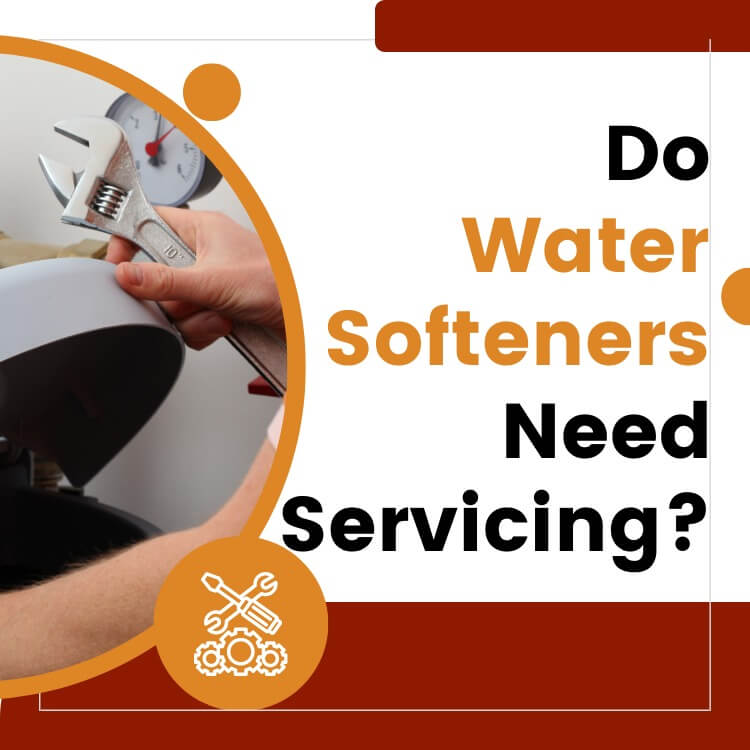
This image is property of waterfiltergeek.co.uk.
Soap Scum and Residue
Difficulty Lathering
Have you noticed that it has become increasingly difficult to create a good lather with your soap or shampoo? If so, your water softener may be to blame. Hard water contains minerals that can interfere with the lathering process and prevent the soap from properly dissolving. This can make it challenging to get your hair, body, and clothes clean, ultimately leading to a less effective washing experience. By servicing your water softener, you can ensure that the water running through your faucets and showerheads is free from the minerals that hinder proper lathering.
Film on Skin and Hair
If you’ve been experiencing dry or irritated skin, or if your hair feels dull and weighted down, it could be due to the presence of soap scum and residue caused by hard water. Soap scum is a sticky, white substance that can build up on your skin and hair when the minerals in hard water react with the soap or shampoo products you use. This film can leave your skin feeling dry and your hair looking lackluster. By addressing the issue at its source and maintaining a properly functioning water softener, you can bid farewell to the unpleasant residue and enjoy healthier skin and hair.
Stains in Bathtub or Shower
Hard water can also leave behind stains in your bathtub or shower, which can be frustrating to clean and remove. These stains are caused by the minerals in hard water interacting with soap and other cleaning products, resulting in stubborn discoloration. Regular cleaning may not be enough to eliminate these stains completely, and they can continue to build up over time. To prevent the accumulation of these unsightly stains and make your cleaning routine more effective, it is important to ensure that your water softener is working optimally.
Dry and Brittle Hair
Static and Frizzy Hair
If you find that your hair is often plagued by static and frizz, even after using various hair care products, your water softener may be the culprit. Hard water minerals can cause a significant imbalance in your hair’s moisture levels, making it prone to static and frizz. When the minerals build up on your hair shaft, they create a barrier that hinders proper hydration and leads to a lack of smoothness and shine. Servicing your water softener can help eliminate these minerals and restore your hair’s natural balance, leaving you with smoother, more manageable locks.
Dull and Lackluster Hair
Hard water can also result in hair that appears dull and lackluster, lacking the vibrant shine and healthy glow that we all desire. The minerals in hard water can strip away the natural oils that give hair its luster, leaving it looking lackluster and lifeless. Additionally, the accumulation of mineral deposits on the hair shaft can prevent light from reflecting off the hair, further contributing to the dull appearance. By ensuring that your water softener is properly maintained, you can help restore the shine to your hair and enhance its overall health and beauty.
Difficulty Styling Hair
If you’ve been struggling to achieve your desired hairstyles or find that your hair doesn’t hold a curl or maintain its style for long, hard water may be the culprit. The minerals present in hard water can make it more difficult for styling products, such as gels, mousses, and hairsprays, to work effectively. They can create a barrier on the hair shaft, preventing these products from being absorbed properly and leading to less-than-desirable results. By addressing the issues caused by hard water through water softener servicing, you can enjoy easier styling and longer-lasting hairstyles.
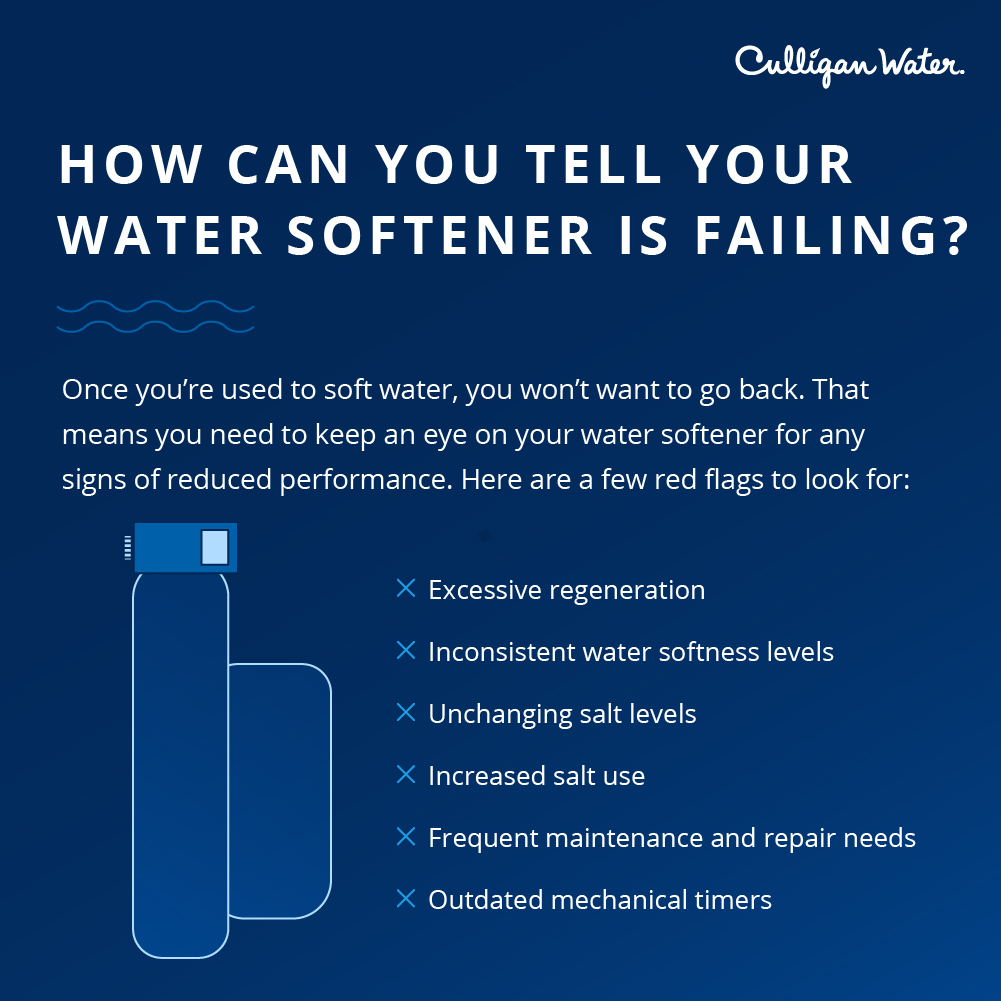
This image is property of wp.culligan.com.
Skin Irritation and Dryness
Itching and Redness
If you’ve been experiencing itching, redness, or other forms of skin irritation, your water softener could be the source of the problem. Hard water can strip away the skin’s natural oils and disrupt its pH balance, leading to dryness, inflammation, and increased sensitivity. Additionally, the minerals in hard water can leave behind residue on the skin, further exacerbating these issues. By ensuring that your water softener is functioning properly, you can minimize the occurrence of skin irritation and enjoy healthier, more comfortable skin.
Flaky Skin
Flaky skin is another common symptom of using hard water. The minerals in hard water can leave behind a residue on the skin, which can trap dead skin cells and prevent proper exfoliation. This build-up of dead skin cells can result in flaky patches, making your skin appear dry and dull. By resolving the underlying issue with your water softener, you can help eliminate the accumulation of mineral residue on your skin and promote a smoother, more radiant complexion.
Dry Patches
If you’ve noticed dry patches on your skin, particularly in areas that are frequently exposed to hard water, it may be a sign that your water softener needs servicing. Hard water minerals can disrupt the skin’s natural moisture barrier, leading to dryness and the formation of rough, dry patches. These patches can be particularly troublesome in areas such as the hands, feet, elbows, and knees. By addressing the hard water issue through water softener maintenance, you can restore the moisture balance in your skin and alleviate dry patches.
Mineral Build-up on Appliances
Kettles and Coffee Makers
Mineral build-up caused by hard water can also affect your household appliances, such as kettles and coffee makers. The minerals in hard water can leave behind a layer of limescale on the heating elements, which can reduce their efficiency and affect their performance. This can result in longer boiling or brewing times and increased energy consumption. To maintain the optimal performance of your appliances and extend their lifespan, regular servicing of your water softener is essential.
Dishwashers
Dishwashers can also fall victim to the negative effects of hard water minerals. Over time, mineral deposits can accumulate in the dishwasher’s spray arms, filters, and other components, leading to decreased effectiveness in cleaning your dishes. This can result in the need for additional rinsing, rewashing, or even the replacement of malfunctioning parts. By ensuring that your water softener is functioning correctly, you can prevent the build-up of mineral deposits in your dishwasher and keep your dishes sparkling clean.
Washing Machines
Hard water can also have a detrimental effect on your washing machine. The minerals in hard water can build up in the machine’s pipes, valves, and drum, leading to reduced water flow and efficient cleaning. This can result in clothes that are not thoroughly cleaned or rinsed, as well as potential damage to the machine itself. By servicing your water softener, you can prevent mineral build-up in your washing machine and maintain its optimal performance, effectively cleaning your laundry.
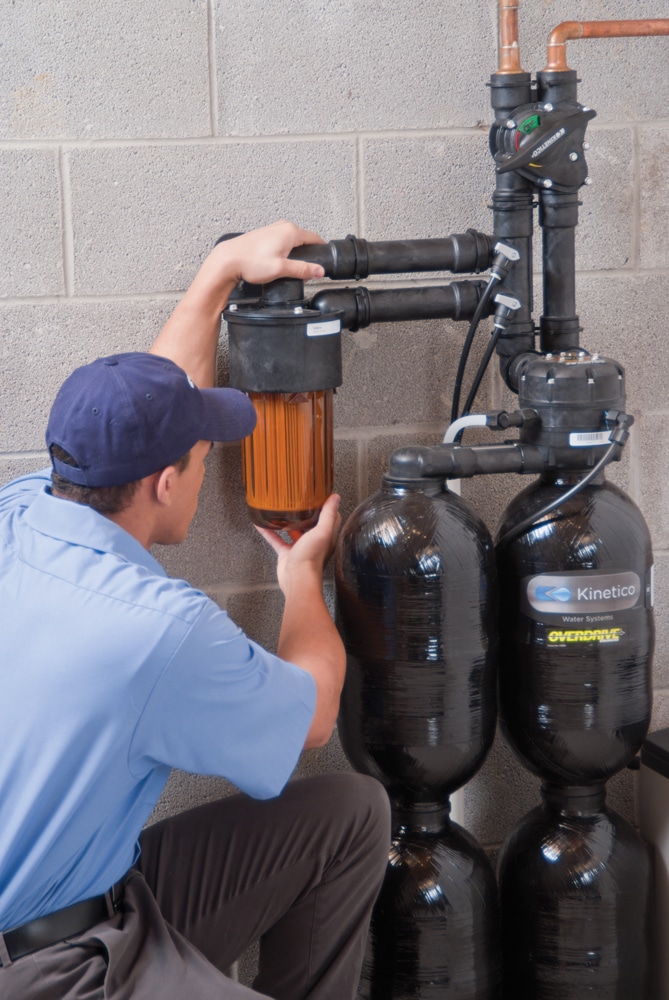
This image is property of kineticoutah.com.
Unpleasant Tastes or Odors
Salty or Metallic Taste
If you’ve noticed that the water from your taps has an unpleasant taste, such as a salty or metallic flavor, it could be due to the presence of hard water minerals. These minerals can alter the taste of water and make it less enjoyable to drink or use for cooking. Additionally, the minerals can interact with certain ingredients in recipes, affecting the overall flavor of your meals. By servicing your water softener and ensuring that it is effectively removing these minerals, you can enjoy better-tasting water and enhance the flavors of your culinary creations.
Rotten Egg Smell
Another common issue associated with hard water is the occurrence of a rotten egg smell in the water. This odor is typically caused by the presence of hydrogen sulfide gas, which can result from the breakdown of organic matter in the water. If your water smells like rotten eggs, it is essential to investigate the issue and have your water softener checked. The servicing of your water softener can help address the root cause of the odor and provide you with clean, odor-free water for your daily needs.
Increased Water Heating Costs
Scale Deposits on Heating Elements
If you’ve noticed a significant increase in your water heating costs, it could be due to the presence of scale deposits on the heating elements of your water heater. When hard water is heated, the minerals it contains can precipitate out and form a layer of scale on the heating elements. This can reduce the efficiency of your water heater and force it to work harder to heat the water, resulting in increased energy consumption and higher bills. By servicing your water softener, you can minimize the build-up of scale deposits and reduce your water heating costs.
Less Efficient Water Heating
In addition to increased energy costs, hard water can also result in less efficient water heating. The presence of mineral deposits in your water heater can insulate the heating elements, making it more difficult for them to transfer heat to the water. This can lead to longer heating times and the need for higher water temperatures to achieve the desired level of hot water. By servicing your water softener and ensuring that it is effectively removing the minerals from your water, you can optimize the efficiency of your water heating system and save both energy and money.
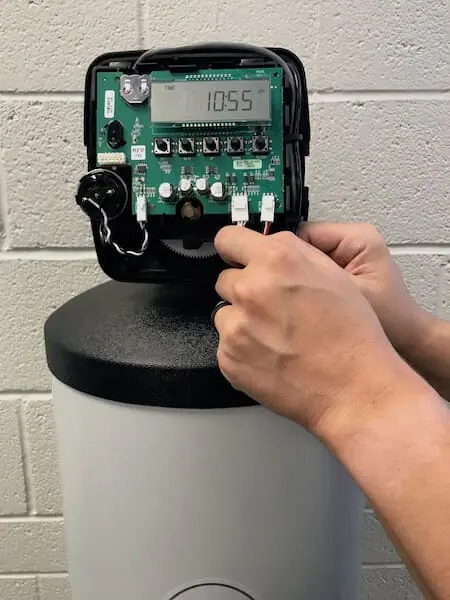
This image is property of clearwaterarizona.com.
Frequent Water Softener Regenerations
Shortened Time Between Regenerations
If you have noticed that your water softener is regenerating more frequently than usual, it is a sign that it may need servicing. The regeneration process is how a water softener removes the minerals it has collected from the water and replenishes its resin bed. However, if the resin bed becomes less effective due to excessive mineral build-up or damage, the water softener may need to regenerate more frequently to compensate for the reduced capacity. By addressing the issue promptly, you can avoid unnecessary regeneration cycles and ensure that your water softener is operating efficiently.
Excessive Salt Usage
Another indication that your water softener needs servicing is the excessive usage of salt. Hard water minerals are typically removed from the water by exchanging them with sodium ions in a water softener. However, if the resin bed in the water softener becomes less efficient, it may require more salt to adequately regenerate and remove the minerals. This can result in a noticeable increase in salt usage, which can be costly and inconvenient. By having your water softener inspected and serviced, you can identify and resolve the underlying issue, reducing your salt consumption and saving you money.
Visible Signs of System Malfunction
Leakages or Water Puddles
If you have discovered leakages or water puddles around your water softener unit, it is a clear sign that something is not right. Leaks can occur due to various reasons, such as damaged components, loose connections, or even excessive water pressure. Regardless of the cause, it is crucial to address these issues promptly to prevent further damage and possible flooding. By seeking professional servicing for your water softener, you can identify and rectify any leaks or water-related problems, ensuring that your unit operates safely and effectively.
Salt Bridge or Salt Crust Formation
A salt bridge or salt crust formation within your water softener is another visible sign that servicing is needed. A salt bridge occurs when a hard layer of salt forms above the water inside the brine tank, preventing the salt from dissolving properly and impeding the regeneration process. This can lead to a decrease in the efficiency of your water softener and result in hard water bypassing the system. A salt crust, on the other hand, is a buildup of salt residue on the walls of the brine tank, which can also interfere with the proper functioning of your water softener. Expert servicing will help eliminate these salt-related issues and ensure the smooth operation of your unit.
Faulty Control Panel
If you encounter issues with the control panel of your water softener, such as flickering lights, error messages, or unresponsive buttons, it is a strong indication that your unit needs servicing. The control panel is an essential component of your water softener that allows you to monitor and adjust its settings. Any glitches or malfunctions in the control panel can compromise the overall performance of your unit and affect its ability to effectively soften the water. By having your water softener inspected and serviced, any control panel issues can be identified and resolved, restoring the functionality of your unit.
In conclusion, it is crucial to pay attention to the signs that your water softener needs servicing. From decreased water pressure to hard water stains, soap scum and residue to dry and brittle hair, there are numerous indicators that your water softener may not be functioning optimally. Additionally, skin irritation and dryness, mineral build-up on appliances, unpleasant tastes or odors, increased water heating costs, frequent regenerations, and visible signs of system malfunction all serve as warning signs that it is time to have your water softener checked and serviced. By addressing these issues promptly, you can ensure the proper functioning of your water softener, prolong its lifespan, and enjoy the benefits of softened water throughout your home.





